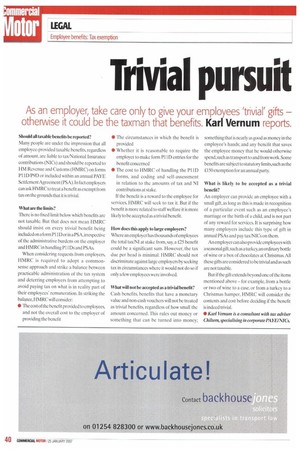Trivial pursuit
Page 40

If you've noticed an error in this article please click here to report it so we can fix it.
As an employer, take care only to give your employees 'trivial' gifts —
otherwise it could be the taxman that benefits. Karl Vernum reports.
Should all taxable benefits be reported?
Many people are under the impression that all employee-provided taxable benefits, regardless of amount, are liable to tax/National Insurance contributions (N1Cs) and should be reported to HM Revenue and Customs (HMRC) on forms P11D/P9D or included within an annual PAYE Settlement Agreement (PSA). In fact employers can ask HIVIRC to treat a benefit as exempt from tax on the grounds that it is trivial.
What are the limits?
lhere is no fixed limit below which benefits are not taxable. But that does not mean HMRC should insist on every trivial benefit being included on a form P11D or in a PSA, irrespective of the administrative burdens on the employer and HMRC in handling P1 1Ds and PSAs.
When considering requests from employers. HMRC is required to adopt a commonsense approach and strike a balance between practicable administration of the tax system and deterring employers from attempting to avoid paying tax on what is in reality part of their employees' remuneration. In striking the balance,HMRC will consider: • The cost of the benefit provided to employees, and not the overall cost to the employer of providing the benefit • The circumstances in which the benefit is provided • Whether it is reasonable to require the employer to make form PI 1D entries for the benefit concerned • The cost to HMRC of handling the P11D forms, and coding and self-assessment in relation to the amounts of tax and NI contributions at stake.
If the benefit is a reward to the employee for services, HMRC will seek to tax it, But if the benefit is more related to staff welfare it is more likely to be accepted as a trivial benefit.
How does this apply to large employers? Where an employer has thousands of employees the total tax/NI at stake from, say, a £25 benefit could be a significant sum. However, the tax due per head is minimal. HMRC should not discriminate against large employers by seeking tax in circumstances where it would not do so if only a few employees were involved.
What will not be accepted as a trivial benefit? Cash benefits, benefits that have a monetary value and non-cash vouchers will not be treated as trivial benefits, regardless of how small the amount concerned. This rules out money or something that can be turned into money; something that is nearly as good as money in the employee's hands; and any benefit that saves the employee money that he would otherwise spend,such as transport to and from work . Some benefits are subject to statutory limits,such as the £150 exemption for an annual party.
What is likely to be accepted as a trivial benefit?
An employer can provide an employee with a small gift, as long as this is made in recognition of a particular event such as an employee's marriage or the birth of a child, and is not part of any reward for services. It is surprising how many employers include this type of gift in annual PSAs and pay tax/N ICs on them.
An employer can also provide employees with a seasonal gift,such as a turkey,an ordinary bottle of wine or a box of chocolates at Christmas. All these gifts are considered to be trivial and as such are not taxable, But if the gift extends beyond one of the items mentioned above — for example, from a bottle or two of wine to a case, or from a turkey to a Christmas hamper, HMRC will consider the contents and cost before deciding if the benefit is indeed trivial.
• Karl Vernum is a consultant with tax adviser Chiltern specialising in corporate PAYE/NICs.






















































































































































































